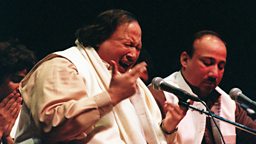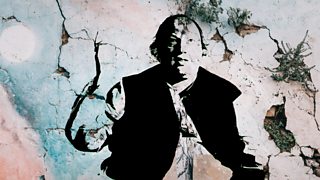A beginner's guide to Qawwali music

Nusrat Fateh Ali Khan is widely credited for bringing global attention to Qawwali music, extending the 600yr old Qawwali tradition of his family. By the time of his death following a heart attack, aged 48, in London, Nusrat was a legend in the artform.
This month sees the 20 year anniversary of his passing and we're celebrating his work, and Qawwali music, on the . But if you're not quite up to speed with this potentially euphoric musical tradition, we've got a beginner's guide to get you started.
Watch a 1983 performance by Nusrat Fateh Ali Khan filmed in Leicester
(Warning: Third party video may contain adverts)
What is Qawwali?
"Qawaali music," explains Bobby Friction, "Is the physical and musical manifestation of the Sufi religious tradition in South Asia. Powerful, poetic & transcendent, its hypnotic rhythms and melodies celebrate God, love and music as one."
Qawaali emerged in what is now India and Pakistan in the 13th century, in close association with the Sufi and their Islamic mysticism. Typically, there are a lot of people involved in a performance, with eight or nine players making music with harmoniums, tabla, dholak and other percussive instruments. There was a time when women were banned from performing Qawwali music, but things have changed.
A lead vocalist and a small team of side singers take turns weaving in several different melodies, some of which will be improvised. After a long, improvised introduction for the main song, the singers all join in and vie with each other as the song builds towards its crescendo and sudden, abrupt end.
It’s all about the build-up, so Qawwali songs are rarely short - there are no radio edits here. They can be anywhere between 15 and 30 minutes long, with one of the longest known Qawwali songs - Hashr Ke Roz Yeh Poochhunga by Aziz Mian Qawwal - being almost two hours long!
Nusrat Fateh Ali Khan performed a charity concert for Imran Khan in 1992
(Warning: Third party video may contain adverts)
What are the religious roots of Qawwali?
Qawwali has a deeply religious history dating right back to the 13th century. It is the music of Sufi-sm, also known as 'Islamic mysticism,' whose followers believe in learning from teachers, rather than relying on texts. The influence of Sufism is huge within Islamic literature, music and the wider artistic beyond.
Qawwali music was originally performed at Sufi shrines, and traditionally as part of a 'mehfil-e sama', a gathering for spiritual listening which often takes place on the anniversary of the death of shrine's saint. It is still very religious music today.
Watch a Nusrat Fateh Ali Khan performance from London's Barbican Centre
(Warning: Third party video may contain adverts)
What happens when people listen to Qawwali?
If you're at a Qawwali performance, you could be in for quite the experience.
Qawwali music is performed with the intention of bringing listeners to a state of religious ecstasy and is known to hypnotize both performers and listeners.
The reaction to Qawwali is intended to bring everyone involved to a spiritual union with God. If you get the chance to see a performance it can be an intense and profoundly moving experience, no matter your personal faith.
Rahat Fateh Ali Khan is the nephew of Nusrat Fateh Ali Khan
(Warning: Third party video may contain adverts)
How has Qawwali evolved over the centuries?
Qawwali music has moved with the times. Women are now welcomed both to perform and watch it, which they weren't for a very long time.
It has also become really popular all over the world. Qawwali music was only really known in South Asia until the late 20th century, but after world music artists began working elements of Qawwali into their work, things went global.
Nusrat Fateh Ali Khan appeared on Peter Gabriel's The Last Temptation of Christ soundtrack in 1988, and released six albums on Real World records. He recorded hundreds more (although some were never released commercially) during his career.
Qawwali musicians were given exposure in the UK with performances at WOMAD festival and supported by Peter Gabriel's record label, Real World, during the early nineties.
The Nooran Sisters are one of the leading female Qawwali acts
(Warning: Third party video may contain adverts)
Who are the important names in Qawwali you need to know?
OK, so Nusrat Fateh Ali Khan is a hugely important Qawwali musician, but who else should we be listening to?
The Sabri Brothers are also a leading force in the Qawwali music industry. They performed together for 60 years, between 1956 and 2016, released 53 albums during their career and their music is definitely worth checking out.
And it's not just India that has produced the big names of Qawwali, Pakistan has a history of stars as well. Amjad Farid Sabri was one of the biggest Qawwali musicians from Pakistan and became one of the genre's most acclaimed stars. Sadly, he was shot dead in Karachi by militants.
Nusrat Fateh Ali Khan's legacy has been continued by his nephew Rahat Fateh Ali Khan, who is currently one of the biggest names in Qawwali music. He was trained by his uncle from the age of seven and has contributed music to many Bollywood and Hollywood movies during his career. He even worked as a judge on TV talent show Chhote Ustaad in India.
The Nooran Sisters (Jyoti and Sultana) are two of the best known female stars of the genre. They came to fame on MTV India's talent show Sound Trippin and have sung in a string of Bollywood films.
Watch The Sabri Brothers perform live in Birmingham
(Warning: Third party video may contain adverts)
More from Asian Network
-
![]()
Celebrating Ustad Nusrat Fateh Ali Khan, the King of Qawwali



